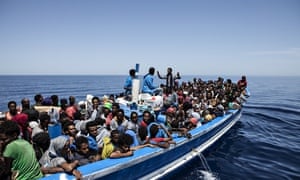PBS: Escaping Eritrea … [Read More...] about ካብ ውሽጢ ቤት ማእሰርታት ኤርትራ
By Natalie Nougayrede, Friday 15 May 2015, The Guardian (UK)

While the EU argues over those drowning in the Mediterranean, it overlooks the need to work with the sub-Saharan countries that people are fleeing
One day in October 2013, Enrico Letta, the then prime minister of Italy, stood in front of 302 coffins lined up inside a ventilated room on the island of Lampedusa. They contained the bodies of those who had perished at sea, in the biggest migrant disaster Europe had known at that point.
Some of the coffins were very small: they contained the bodies of children. The smell of death hung in the air. There was complete silence, except for the creaking sound of the air conditioning. It was a moment of deep reckoning. Letta suddenly realised that Europe’s indifference, and its powerlessness, had created a situation where thousands of human lives were put at risk. For Letta, that day marked the starting point of Mare Nostrum, an operation Italy launched to search and rescue migrants attempting the perilous crossing from Africa to Italy.
Letta tells this story in his recent book Andare insieme, andare lontano [Going Together, Going Far], in which he describes his experience as head of the Italian government in 2013-14. He says the migrant crisis became the “gravest issue” he had to deal with as prime minister. But, as Letta points out, doing something about those deaths wasn’t just about putting an end to our shame or sense of guilt. It had to do with a certain conception of civic and political duty. Those boat people in the Mediterranean came as a reminder that there were things that simply had to be done: there were moral obligations. But the fact is also that Italyended up alone in bearing the brunt of the effort.
A lot of this came back to the fore in recent weeks, as even worse mass drownings have occurred off the Italian coast. More than 1,800 people have died in the Mediterranean since the beginning of the year. European ministers have scrambled to produce a list of possible measures, ranging from mandatory national quotas for refugees to the military targeting of trafficking networks in Libya, the country that acts as the biggest launchpad for migrants.
There is much discussion of how realistic some of these ideas are. Thecancellation of the Mare Nostrum programme in the final months of 2014 has been widely criticised. New commitments have been made to strengthen Triton, a European border protection programme suddenly given the task of saving people at sea – all while operating within a much smaller radius off the Italian coast than Mare Nostrum.
The deeper problem is that only the downstream aspect of the migrant tragedy is being addressed. The issues at the other end – where these migrants come from, and why – have hardly been studied in depth, or with strategic solutions in mind. There has been much focus on the resources for rescue operations, on the situation in Libya, its traffickers and its boats, and on how many asylum seekers will be taken in by European countries. But just as Letta wrote in his book, there is a much larger issue at play here, and one that no one seems quite ready to confront: the question of why millions of people decide to uproot themselves from Africa in search of a better life in Europe.
Concentrating on Syrian war refugees, many of whom now arrive in Europe via other routes, misses a bigger story: the largest group of people crossing the Mediterranean to get to Europe this year were those from sub-Saharan Africa. One Rome-based European official went as far as claiming that “90% to 95% of migrants” who arrived on Italian shores in recent months had come from countries in western and sub-Saharan Africa such as Senegal, Mali or Ivory Coast – though official figures compiled by the Italian interior ministry put their numbers considerably lower.
These are not necessarily war refugees, but often young men fleeing poverty, unemployment, repression and corrupt political regimes. They are aware of the risk posed by the potentially deadly crossing of the Med, but willing to take it in the hope of reaching a more affluent part of the world and building a future there. Sub-Saharan Africa is a demographic time bomb waiting to happen: according to some estimates, its population will double by 2050.
Neither the EU nor its member states have engaged in a comprehensive dialogue with these African countries about the causes of migration. It is not just that development aid has shrunk in recent years. It is that African governments haven’t even been asked hard questions about the trafficking networks taking root in their countries – Niger banning people-smuggling this week is so far an honourable exception. Not to mention the money trail: if the business of trafficking humans across the Sahara and the Mediterranean brings in hundreds of millions of dollars annually, surely that pile of money is not hiding under a mattress somewhere in Libya.
Tracking the money, possibly into tax havens, may be more efficient than destroying fishermen’s boats. All these questions are pending. To tackle the migration problem, a more far-reaching European approach is needed, not just rescue operations and emotional appeals, however necessary. The geographical dimension of African migration hasn’t yet sunk into our minds. Yet how we deal with it will determine Europe’s future.
It is fitting that Letta has put an African proverb on the cover of his book: “If you want to go fast, go alone. If you want to go far, go together”. Europe will be able to cope with its immigration problem only if it works with Africa.
